Energizing herbal tea blends can offer natural relief for chronic fatigue syndrome. You'll find a variety of powerful herbs like ashwagandha, rhodiola, and ginseng that boost energy and reduce stress. Green tea, yerba mate, and peppermint provide stimulating effects without the crash associated with caffeine. Antioxidant-rich blends with goji berries or elderberry support immune function and combat oxidative stress. For best results, steep your chosen blend for 5-10 minutes and aim to drink 2-3 cups throughout the day. Incorporate these teas into your daily routine to experience sustained energy, improved mood, and better sleep. Discover how these potent herbal combinations can transform your well-being.
Understanding Chronic Fatigue Syndrome
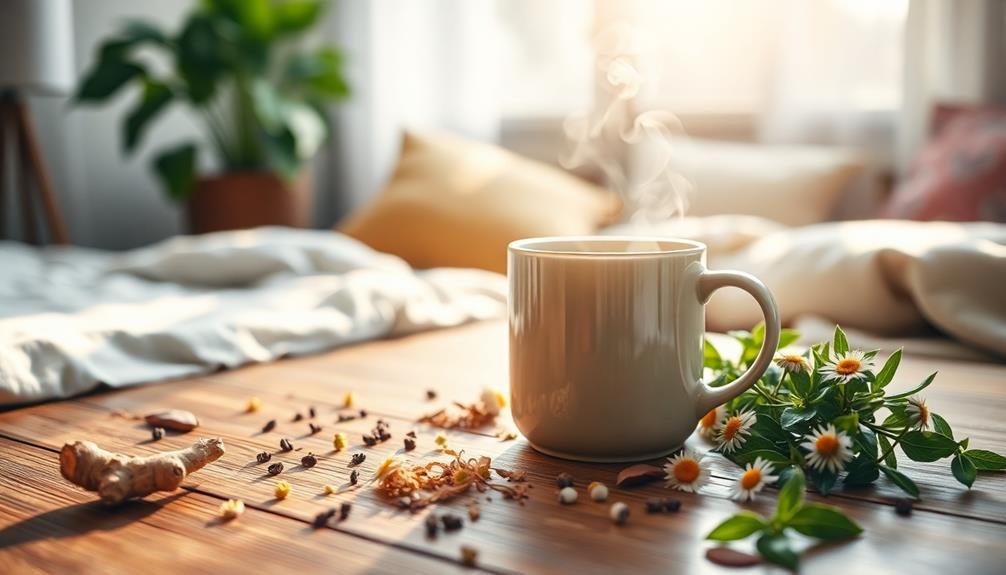
For those grappling with chronic fatigue syndrome (CFS), everyday tasks can feel insurmountable. This complex disorder is characterized by extreme fatigue that doesn't improve with rest and can't be explained by underlying medical conditions. You may experience a range of symptoms, including persistent exhaustion, difficulty concentrating, muscle pain, and unrefreshing sleep.
CFS affects people differently, but it typically interferes with your ability to carry out normal activities. The exact cause remains unknown, though researchers believe it may involve a combination of factors, such as viral infections, immune system problems, and hormonal imbalances.
Diagnosis can be challenging, as there's no single test for CFS. Your doctor will likely review your medical history, perform physical exams, and rule out other conditions before reaching a diagnosis.
While there's no cure for CFS, various treatments can help manage symptoms. These may include medications, cognitive behavioral therapy, and graded exercise therapy.
It's essential to work closely with your healthcare provider to develop a personalized treatment plan. Additionally, lifestyle changes like improving sleep habits, managing stress, and pacing your activities can make a significant difference in your daily life with CFS.
Benefits of Herbal Tea
While managing CFS often involves medical treatments, many people find relief through natural remedies like herbal teas. These soothing beverages offer a gentle, yet effective way to support your body's healing processes and alleviate some symptoms of chronic fatigue.
Herbal teas can provide numerous benefits for CFS sufferers:
- Boost energy levels without the crash associated with caffeine
- Reduce inflammation throughout the body
- Support immune function to fight off infections
- Promote relaxation and improve sleep quality
Many herbs used in these teas contain antioxidants that help combat oxidative stress, a common issue in CFS patients. They can also aid digestion, which is often compromised in those with chronic fatigue.
Some blends may help balance hormones and support adrenal function, addressing underlying causes of fatigue.
You'll find that incorporating herbal teas into your daily routine can be a comforting ritual, offering both physical and emotional support.
They're easy to prepare, affordable, and can be enjoyed hot or cold. By choosing the right blend of herbs, you're giving your body natural tools to fight fatigue and improve overall well-being.
Key Herbs for Energy Boost
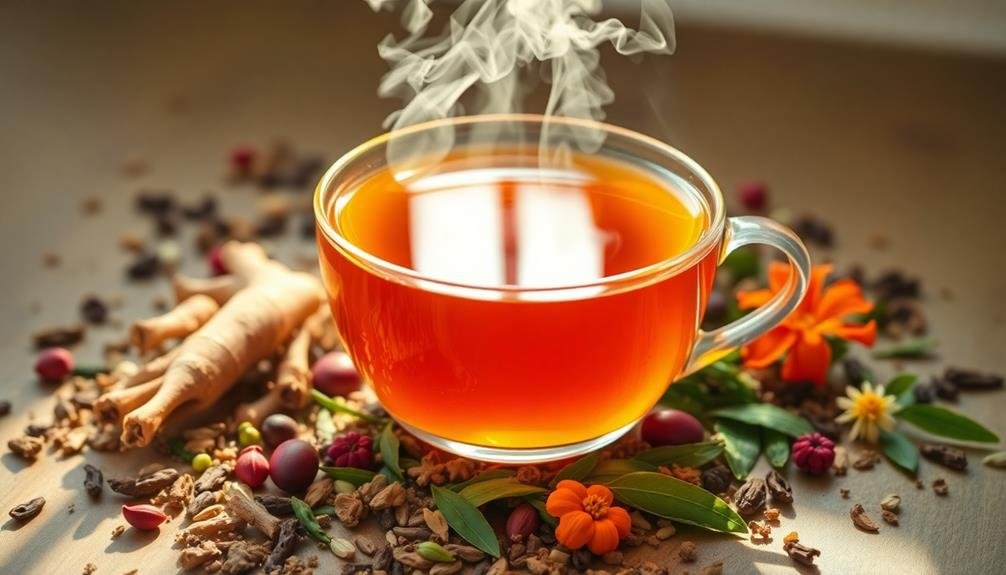
When seeking herbal remedies for chronic fatigue, you'll want to focus on three key categories of energy-boosting herbs.
Adaptogenic herbs like ashwagandha and rhodiola can help your body manage stress and improve vigor.
You can also turn to stimulating herbs such as ginseng or yerba mate for a quick energy boost, or nutrient-rich herbal tonics like nettle and oatstraw to nourish your body and support long-term energy production.
Adaptogenic Herbs for Vitality
In the domain of herbal remedies, adaptogenic herbs stand out as powerful allies for combating chronic fatigue. These remarkable plants help your body adapt to stress and restore balance, boosting your overall energy.
When you're struggling with chronic fatigue, incorporating adaptogenic herbs into your tea blends can make a significant difference in your energy levels and resilience.
Some of the most effective adaptogenic herbs for energy include:
- Ashwagandha: Known for its ability to reduce stress and anxiety
- Rhodiola: Enhances mental and physical performance
- Ginseng: Improves cognitive function and reduces fatigue
- Holy Basil: Supports immune function and promotes calm
To harness the power of these adaptogens, try adding them to your daily tea routine. You can mix them with other energizing herbs like peppermint or ginger for a more complex flavor profile.
Start with small amounts and gradually increase as your body adjusts. Remember, consistency is key when working with adaptogenic herbs.
You'll likely notice improvements in your energy levels, mood, and overall well-being within a few weeks of regular use.
Always consult with a healthcare professional before adding new herbs to your regimen, especially if you're taking medications or have underlying health conditions.
Stimulating Herbal Energy Boosters
Adaptogens offer long-term support for energy, but sometimes you need a quicker boost. That's where stimulating herbs come in. These natural energy enhancers can provide a more immediate lift to combat fatigue.
Caffeine-containing herbs are popular choices. Green tea, with its balanced caffeine content and L-theanine, offers a smooth energy increase without the jitters. Yerba mate, a South American favorite, delivers a sustained energy boost and mental clarity.
For a caffeine-free option, consider ginseng, known for its revitalizing properties and ability to improve mental focus. Peppermint is another invigorating herb that can enhance alertness and cognitive function. Its invigorating aroma alone can help combat mental fatigue.
Rosemary, with its stimulating essential oils, can improve memory and concentration while providing a gentle energy boost. For a quick pick-me-up, try ginger. It stimulates circulation, which can help fight fatigue and improve overall energy levels.
Nutrient-Rich Herbal Tonics
Nature's pharmacy offers a wealth of nutrient-rich herbs that can boost your energy levels and combat chronic fatigue. These herbal tonics provide essential vitamins, minerals, and antioxidants that support your body's natural energy production processes.
Incorporate these nutrient-rich herbs into your daily tea routine:
- Nettle leaf: Packed with iron, calcium, and vitamin C, it helps improve oxygen transport and cellular energy production.
- Goji berries: Rich in antioxidants and amino acids, they support immune function and overall vigor.
- Ashwagandha root: An adaptogenic herb that helps balance stress hormones and enhances stamina.
- Moringa leaf: Loaded with vitamins A, C, and E, it fights oxidative stress and boosts energy levels.
To create a potent nutrient-rich herbal tonic, combine equal parts of these herbs in a tea infuser. Steep in hot water for 5-10 minutes, allowing the nutrients to fully extract.
You can enjoy this tonic hot or iced, and it's best consumed in the morning or early afternoon to maximize its energizing effects.
Adaptogenic Herbs for Stress Relief
Several adaptogenic herbs offer powerful stress-relieving properties that can help combat chronic fatigue. These herbs work by regulating your body's stress response, helping you adapt to physical and mental stressors more effectively.
Ashwagandha, a popular Ayurvedic herb, can reduce cortisol levels and improve sleep quality. You'll find it particularly useful if anxiety contributes to your fatigue.
Rhodiola rosea is another potent adaptogen that can enhance your mental performance and reduce fatigue. It's known to boost energy levels and improve mood, making it an excellent choice for those dealing with chronic exhaustion.
Holy basil, or Tulsi, is revered for its ability to balance stress hormones and promote relaxation. You can easily incorporate it into your daily tea routine.
Ginseng, both American and Asian varieties, can increase your resistance to stress and support overall wellness. It's particularly effective in combating mental fatigue and improving cognitive function.
Antioxidant-Rich Tea Blends
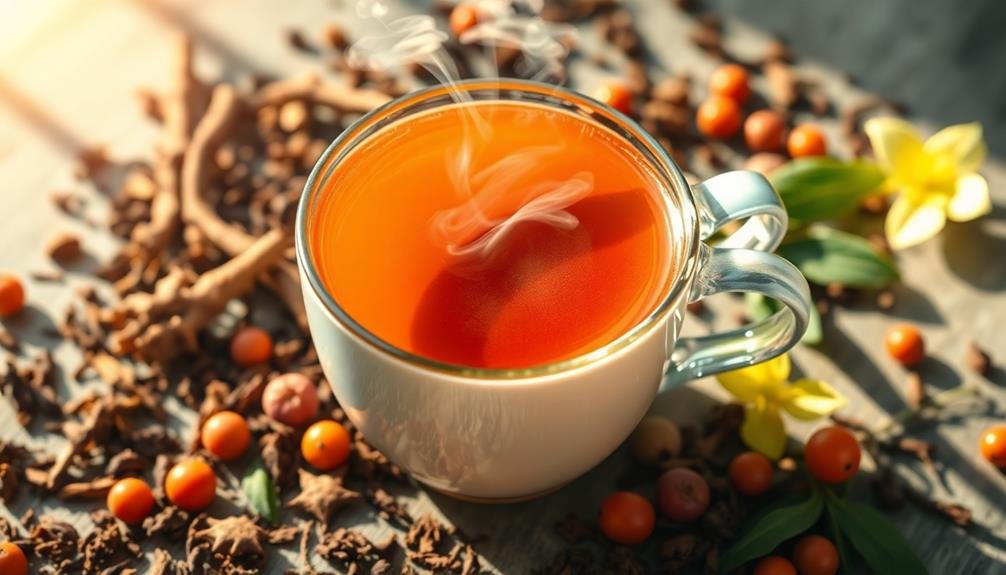
Rich in antioxidants, certain herbal teas can greatly boost your body's defense against oxidative stress, which often contributes to chronic fatigue. These powerful blends not only fight free radicals but also support your overall health and energy levels.
You'll find that incorporating antioxidant-rich teas into your daily routine can make a significant difference in how you feel.
Some of the most potent antioxidant tea blends include green tea with goji berries, rooibos with elderberry, hibiscus with rosehips, and white tea with blueberry. These combinations offer a synergistic effect, maximizing the benefits you'll receive from each sip.
When brewing these teas, imagine:
- Vibrant red hibiscus petals steeping in hot water
- Golden rooibos leaves swirling with dark purple elderberries
- Delicate white tea leaves mingling with plump, juicy blueberries
- Emerald green tea leaves dancing alongside bright red goji berries
To get the most out of these antioxidant-rich blends, steep them for the recommended time and temperature.
You'll notice a boost in your energy levels and overall well-being as you make these teas a regular part of your fatigue-fighting routine.
Immune-Boosting Herbal Combinations
You'll find powerful immune support in herbal tea blends that combine echinacea and elderberry.
These two herbs work synergistically to enhance your body's natural defenses against illness.
For an even more potent immune-boosting effect, consider incorporating adaptogenic herbs like ashwagandha or rhodiola into your tea blends.
Echinacea and Elderberry Blend
Combining the immune-boosting powers of echinacea and elderberry creates a potent herbal blend that can help combat chronic fatigue. This dynamic duo works synergistically to strengthen your body's natural defenses, potentially reducing the frequency and severity of illnesses that can exacerbate fatigue symptoms.
Echinacea, a native North American herb, stimulates your immune system by increasing white blood cell production. Elderberry, rich in antioxidants and vitamins, complements echinacea's effects by fighting inflammation and supporting overall immune function.
When brewed together, they create a flavorful and therapeutic tea that you can enjoy daily.
To prepare this immune-boosting blend, you'll need:
- Dried echinacea root or leaves
- Dried elderberries
- A tea infuser or reusable tea bag
- Hot water
Steep 1 teaspoon each of echinacea and elderberry in boiling water for 10-15 minutes. You can drink this tea hot or iced, and it's safe to consume up to three times daily.
For best results, incorporate this blend into your routine during cold and flu season or when you're feeling particularly run down. Remember, while herbal teas can be beneficial, they shouldn't replace medical advice or treatment for chronic fatigue syndrome.
Adaptogenic Herbs Combination
Feeling overwhelmed by stress and fatigue? Adaptogenic herbs might be the solution you're looking for. These powerful plants help your body adapt to physical, mental, and environmental stressors, making them ideal for combating chronic fatigue.
To create an energizing adaptogenic tea blend, combine equal parts of ashwagandha, rhodiola, and holy basil. Ashwagandha reduces cortisol levels and improves energy, while rhodiola enhances mental performance and physical endurance.
Holy basil, also known as tulsi, helps balance stress hormones and boosts immunity.
Add a pinch of ginseng to your blend for an extra energy boost. This herb improves cognitive function and reduces fatigue. For a calming effect, include some schisandra berries, which support adrenal function and promote relaxation.
To prepare your adaptogenic tea, steep 1-2 teaspoons of the herb mixture in hot water for 5-10 minutes. Drink this blend once or twice daily for best results.
You'll likely notice improved energy levels, better stress management, and enhanced overall well-being within a few weeks of consistent use.
Caffeine-Free Energy Alternatives
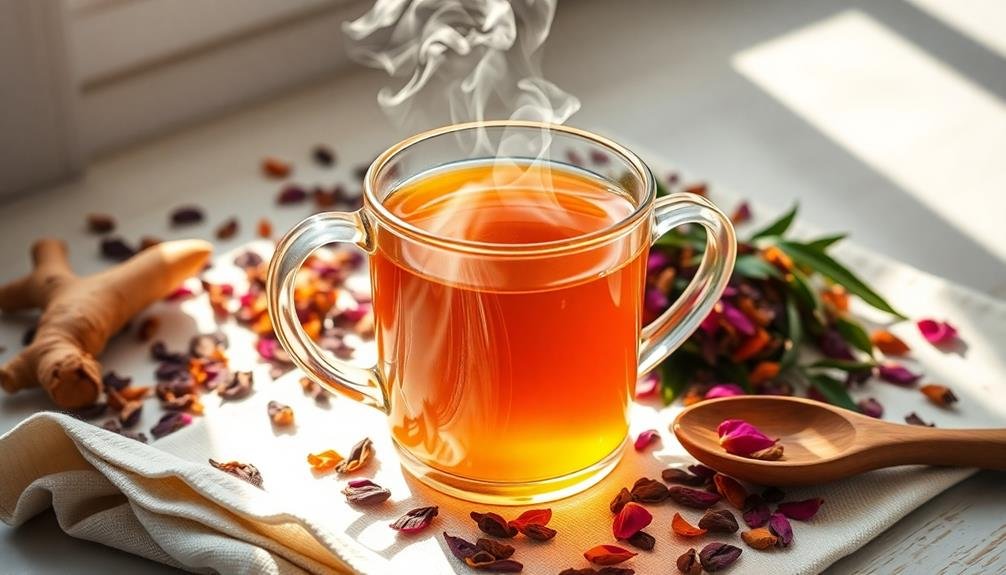
Caffeine-free energy alternatives offer a gentle yet effective approach to combating chronic fatigue. These herbal blends can provide a sustained boost without the jitters or crashes associated with caffeine.
You'll find that incorporating these teas into your daily routine can help stabilize your energy levels and improve overall well-being.
Consider trying these caffeine-free options:
- Ginseng and eleuthero root blend
- Rhodiola and ashwagandha infusion
- Licorice root and peppermint tea
- Ginger and lemongrass combination
These herbal teas work by supporting your body's natural energy production processes. They can help regulate stress hormones, improve circulation, and enhance cellular function.
You'll notice a gradual increase in liveliness and mental clarity as you consistently consume these blends.
To maximize the benefits, steep your chosen herbs for 5-10 minutes in hot water. Drink 2-3 cups throughout the day, starting with one in the morning and another in the early afternoon.
You can also experiment with cold brewing these teas overnight for a revitalizing iced version during warmer months.
Remember to consult with a healthcare professional before adding new herbs to your regimen, especially if you're taking medications or have existing health conditions.
Detoxifying Herbal Tea Recipes
Detoxifying herbal tea recipes can complement your energy-boosting regimen by cleansing your body and supporting overall wellness. These blends often incorporate ingredients known for their purifying properties, helping to rid your system of toxins that may contribute to fatigue.
Try a blend of dandelion root, burdock root, and nettle leaf for a powerful detox tea. Dandelion supports liver function, while burdock aids in blood purification and nettle provides essential nutrients. Steep these herbs for 10-15 minutes in hot water for ideal results.
Another effective recipe combines milk thistle, turmeric, and ginger. Milk thistle is renowned for its liver-protective qualities, turmeric offers anti-inflammatory benefits, and ginger aids digestion. Add a pinch of black pepper to enhance turmeric absorption.
For a milder detox, mix green tea with lemon and mint. Green tea's antioxidants support overall health, lemon aids in liver detoxification, and mint soothes the digestive system. Brew the green tea first, then add fresh lemon juice and a few mint leaves.
Remember to consult with a healthcare professional before incorporating new herbal remedies into your routine, especially if you have existing health conditions or are taking medications.
Anti-Inflammatory Tea Blends
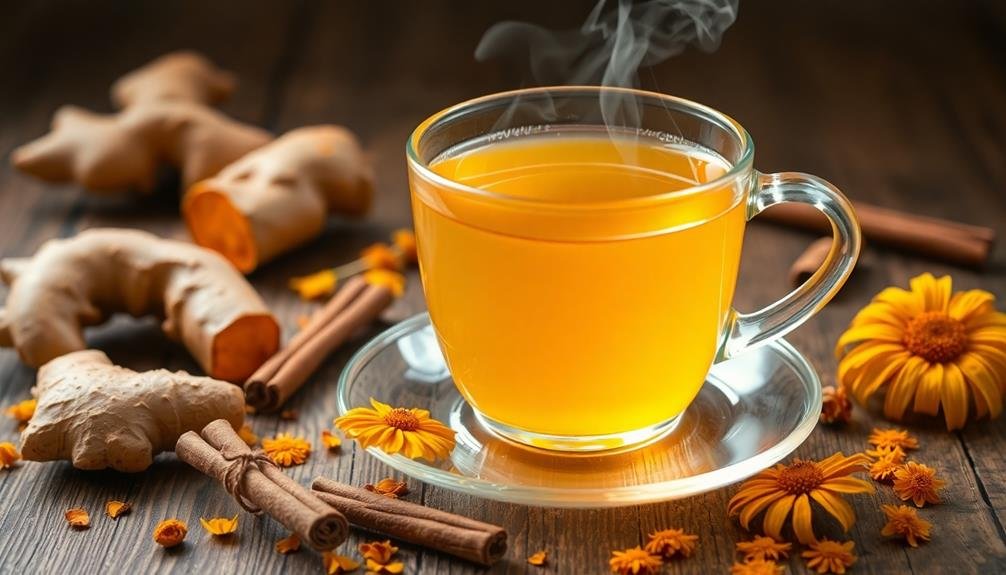
You'll find several anti-inflammatory tea blends that can help alleviate chronic fatigue symptoms.
Try mixing turmeric and ginger for a potent, spicy brew, or combine rosehip and hibiscus for a tart, vitamin C-rich infusion.
For a milder option, blend green tea with nutrient-dense moringa leaves to boost your energy and reduce inflammation.
Turmeric and Ginger Mix
A potent anti-inflammatory blend, turmeric and ginger tea can provide relief for those struggling with chronic fatigue. This powerful combination harnesses the healing properties of curcumin from turmeric and gingerols from ginger, both of which are known for their ability to reduce inflammation and boost energy levels.
To prepare this invigorating tea, you'll need:
- Fresh turmeric root, grated
- Fresh ginger root, sliced
- Hot water
- Optional: honey or lemon to taste
Steep the turmeric and ginger in hot water for 5-10 minutes, allowing the flavors and beneficial compounds to infuse. Strain the tea and add honey or lemon if desired. For maximum benefits, drink this tea daily, preferably in the morning or early afternoon.
The anti-inflammatory properties of turmeric and ginger can help alleviate symptoms associated with chronic fatigue, such as muscle pain and brain fog.
Additionally, this blend may improve digestion, enhance immune function, and promote overall well-being. By incorporating this tea into your daily routine, you're taking a natural approach to managing chronic fatigue and supporting your body's healing processes.
Rosehip Hibiscus Infusion
Another powerful anti-inflammatory blend for chronic fatigue relief is the Rosehip Hibiscus Infusion. This vibrant, tangy tea combines the vitamin C-rich rosehips with the antioxidant-packed hibiscus flowers. Together, they create a potent mix that can help reduce inflammation, boost your immune system, and provide a natural energy lift.
To make this infusion, you'll need equal parts dried rosehips and hibiscus flowers. Steep 1-2 teaspoons of the blend in hot water for 5-7 minutes. You can enjoy this tea hot or iced, depending on your preference.
Here's a quick breakdown of the benefits you can expect from this invigorating blend:
| Benefit | Rosehips | Hibiscus |
|---|---|---|
| Vitamin C | ✓ | ✓ |
| Antioxidants | ✓ | ✓ |
| Anti-inflammatory | ✓ | ✓ |
| Immune support | ✓ | ✓ |
| Blood pressure support | ✓ |
For an extra boost, try adding a slice of fresh ginger or a spoonful of raw honey to your infusion. These additions can enhance the tea's anti-inflammatory properties and provide a natural sweetness. Remember to consult with your healthcare provider before incorporating new herbal remedies into your routine, especially if you're taking medications or have underlying health conditions.
Green Tea Moringa Blend
Powerhouse ingredients combine in the Green Tea Moringa Blend, offering a potent anti-inflammatory punch for those battling chronic fatigue. This dynamic duo pairs the antioxidant-rich green tea with nutrient-dense moringa leaves, creating a synergistic effect that may help reduce inflammation and boost energy levels.
Green tea contains L-theanine, an amino acid that promotes relaxation without drowsiness, while its moderate caffeine content provides a gentle energy boost. Moringa, often called the "miracle tree," is packed with vitamins, minerals, and antioxidants that support overall health and liveliness.
To prepare this invigorating blend, you'll need:
- 1 teaspoon of loose-leaf green tea
- 1 teaspoon of dried moringa leaves
- 8 ounces of hot water (175°F)
- Optional: a slice of lemon or a teaspoon of honey
Steep the tea for 3-5 minutes, then strain and enjoy. You'll notice a light, earthy flavor with subtle grassy notes.
This blend can be consumed hot or iced, making it versatile for any season. Drink it in the morning to kickstart your day or in the afternoon to combat fatigue and support your body's natural anti-inflammatory processes.
Herbal Teas for Better Sleep
In addition to combating daytime fatigue, certain herbal teas can greatly improve your sleep quality. These soothing blends help relax your mind and body, preparing you for a restful night. Chamomile, valerian root, and passionflower are popular choices known for their sedative properties.
Lavender tea is another excellent option, renowned for its calming effects and ability to reduce anxiety. You'll also find lemon balm and magnolia bark effective in promoting better sleep. For those who prefer fruity flavors, tart cherry tea is a natural source of melatonin, the sleep hormone.
Here's a quick guide to some of the best herbal teas for sleep and their benefits:
| Herbal Tea | Benefits |
|---|---|
| Chamomile | Reduces anxiety, improves sleep quality |
| Valerian Root | Decreases insomnia, enhances deep sleep |
| Passionflower | Eases restlessness, promotes relaxation |
| Lavender | Calms nerves, reduces stress |
| Lemon Balm | Alleviates insomnia, soothes digestive issues |
Remember to steep these teas for at least 5-10 minutes to extract their full benefits. It's best to drink them about an hour before bedtime to allow their effects to kick in. By incorporating these herbal teas into your nightly routine, you'll likely experience improved sleep quality and wake up feeling more refreshed.
Mood-Enhancing Herbal Infusions
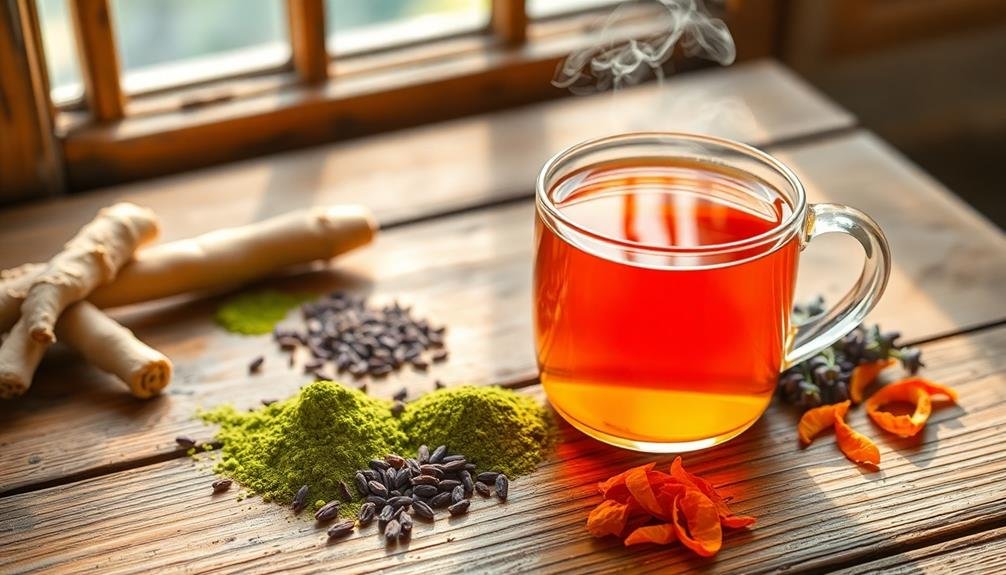
Mood-boosting herbal teas can play a significant role in alleviating the emotional symptoms of chronic fatigue. These infusions can help lift your spirits, reduce anxiety, and promote a sense of well-being.
St. John's Wort tea, known for its antidepressant properties, may help improve your mood and combat feelings of sadness often associated with chronic fatigue. Lemon balm, with its calming effects, can ease stress and promote relaxation, while also enhancing cognitive function.
Another excellent mood-enhancing option is chamomile tea. It's renowned for its ability to soothe nerves and reduce anxiety, helping you feel more balanced and at ease.
Green tea, rich in L-theanine, can boost your mood while providing a gentle energy lift.
When brewing these mood-enhancing teas, imagine:
- The steam rising from your cup, carrying the soothing aroma
- The warmth of the mug in your hands, comforting and grounding
- The vibrant colors of the herbs steeping in clear water
- The first sip, spreading warmth and calm throughout your body
Proper Brewing Techniques
How you brew your herbal teas can greatly impact their effectiveness for chronic fatigue relief. To maximize the benefits, start by using fresh, filtered water. Bring it to a full boil, then let it cool for about a minute before pouring over your herbs. This prevents scorching delicate leaves and guarantees ideal extraction of beneficial compounds.
For most herbal blends, steep for 5-10 minutes. However, some roots and barks may require longer steeping times of up to 15 minutes. Use a timer to avoid over-steeping, which can lead to bitter flavors and reduced efficacy. Cover your cup or teapot during steeping to prevent volatile oils from escaping.
Use the right amount of herbs: generally, one teaspoon per cup of water for dried herbs, or two teaspoons for fresh. If you're using tea bags, gently squeeze them before removing to release more nutrients. For loose herbs, strain thoroughly using a fine mesh strainer or cheesecloth.
To enhance absorption, sip your tea slowly and mindfully. Drink it warm, not scalding hot, to protect your digestive system. For chronic fatigue relief, aim to consume 2-3 cups daily, spacing them throughout your day for sustained energy.
Incorporating Tea Into Daily Routine

Integrating herbal tea into your daily routine can greatly boost your efforts to combat chronic fatigue. Start by replacing your morning coffee with an energizing blend of green tea and ginseng. This swap will provide a gentler caffeine boost without the jitters or crash often associated with coffee.
Throughout the day, sip on adaptogenic teas like ashwagandha or holy basil to help your body manage stress and maintain energy levels. Keep a thermos of your favorite blend at your desk or in your bag for easy access.
In the afternoon, when you might typically reach for a sugary snack, opt for a cup of peppermint or ginger tea to invigorate your senses and curb cravings.
Before bed, wind down with a calming chamomile or lavender tea to promote restful sleep.
To make your tea routine more enjoyable and memorable, try:
- Using a beautiful, colorful mug that brings you joy
- Creating a cozy tea nook in your home with soft lighting and comfortable seating
- Practicing mindfulness while brewing and sipping your tea
- Experimenting with different tea blends and flavors to keep things interesting
Frequently Asked Questions
Can Herbal Teas Interact With Medications for Chronic Fatigue Syndrome?
Yes, herbal teas can interact with medications for chronic fatigue syndrome. You should always consult your doctor before combining herbal teas with prescribed drugs. Some interactions may reduce medication effectiveness or cause unwanted side effects.
Are There Any Potential Side Effects of Drinking Energizing Herbal Teas?
Yes, you could experience side effects from energizing herbal teas. They might cause insomnia, anxiety, or increased heart rate. Some herbs can interact with medications or trigger allergies. It's best to consult your doctor before consuming regularly.
How Long Does It Take to See Results From Drinking Herbal Teas?
You'll typically notice results from drinking herbal teas within a few days to a few weeks. It depends on the specific herbs, your body's response, and how consistently you drink them. Be patient and give it time to work.
Can Children With Chronic Fatigue Syndrome Safely Consume These Herbal Tea Blends?
You shouldn't give children herbal tea blends for chronic fatigue syndrome without consulting a pediatrician. Some herbs can be unsafe for kids. Instead, focus on a balanced diet, proper sleep, and gentle exercise as recommended by their doctor.
Are There Specific Herbal Teas to Avoid During Pregnancy or Breastfeeding?
You should avoid certain herbal teas during pregnancy and breastfeeding. Don't consume herbs like sage, parsley, licorice root, and kombucha. It's best to consult your healthcare provider for a complete list of safe options.
In Summary
You've now discovered a world of energizing herbal tea blends to help combat chronic fatigue. By incorporating these natural remedies into your daily routine, you'll boost your energy, reduce stress, and improve your overall well-being. Remember to experiment with different combinations and brewing techniques to find what works best for you. Don't forget to consult your healthcare provider before making significant changes to your diet or lifestyle. Embrace the power of herbal teas and reclaim your vigor!

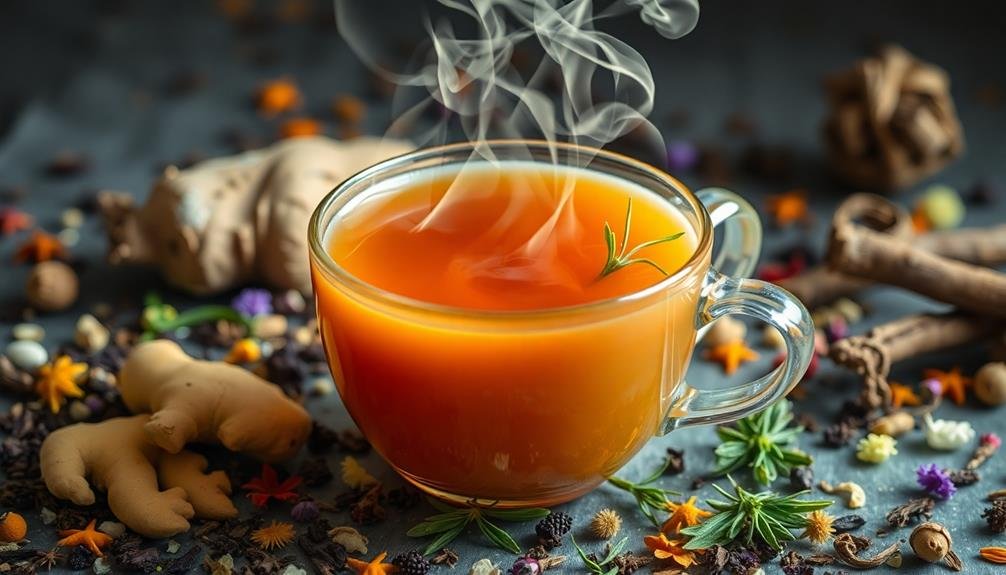


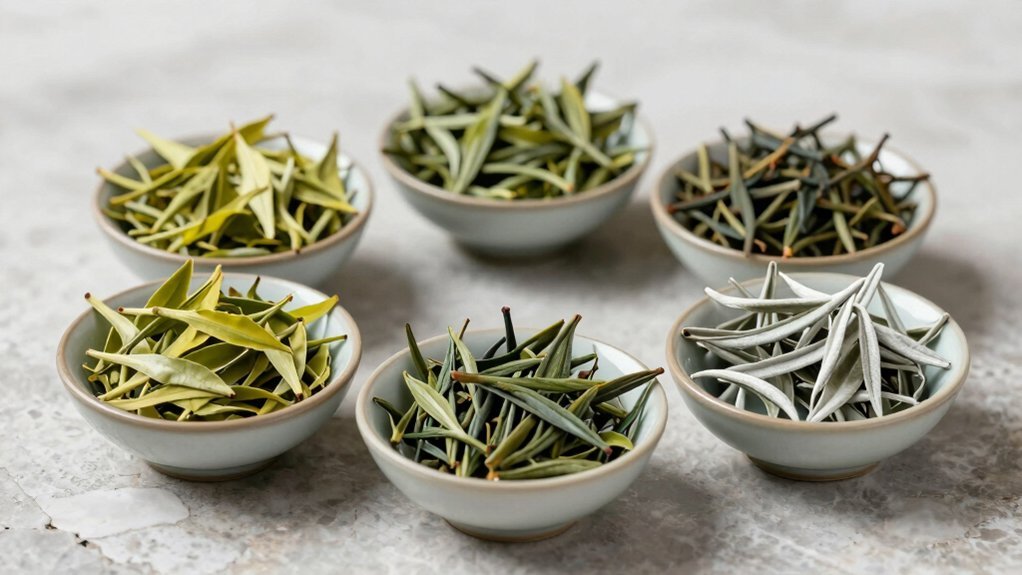
Leave a Reply